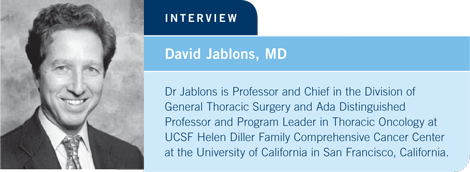
 |
|||||||

| Tracks 1-15 | ||||||||||||||||||||||||||||||||
|
Select Excerpts from the Interview
Track 1
![]() DR LOVE: Would you discuss the role of surgery in the management of
Stage III NSCLC?
DR LOVE: Would you discuss the role of surgery in the management of
Stage III NSCLC?
![]() DR JABLONS: Stage III is probably the most confusing of all the stages of lung
cancer for medical oncologists, resulting in endless debates at tumor boards.
DR JABLONS: Stage III is probably the most confusing of all the stages of lung
cancer for medical oncologists, resulting in endless debates at tumor boards.
Unfortunately, in 2005 data from a Phase III study of concurrent chemotherapy and radiation therapy with or without surgical resection for patients with Stage IIIA NSCLC were presented, and it was concluded to be a negative trial for surgery (Albain 2005; [1.1]).
However, if you carefully examined the subset analysis, you could see that surgery was beneficial, in terms of local control and survival, for patients who avoided pneumonectomy. Although it was a good trial with approximately 400 patients, I believe the conclusion was misconstrued, and as a result, many patients are not obtaining surgical opinions or undergoing surgery.
An enormous number of patients present with Stage III disease, particularly Stage IIIA, each year. Approximately 30,000 to 35,000 cases are reported annually. In centers with experienced surgeons, the morbidity and mortality of surgical resection can be reduced to one percent or less. Yet many of those patients are not offered a surgical option.
The problem is that the local failure rate with chemoradiation therapy in clinical trials is 30 to 40 percent, and when the cancer recurs a year later, surgery is all but impossible. I believe that most aggressive oncologists still feel surgery is the best local control for patients with Stage IIIA lung cancer.
Of course, I’m not suggesting surgery for patients who experience disease progression on chemoradiation therapy or patients with bulky, multistation, N2 disease. Those patients will not fare well either way, and surgery has little to offer. However, for patients with limited N2 burden and a good performance status who can get by with lobectomy, surgery can be beneficial.

Tracks 2-4, 8
![]() DR LOVE: Would you discuss a patient from your practice for whom you
recommended preoperative treatment?
DR LOVE: Would you discuss a patient from your practice for whom you
recommended preoperative treatment?
![]() DR JABLONS: I recently treated a 60-year-old, otherwise healthy man who
had no symptoms despite a 5-cm, left upper lobe, moderately differentiated
adenocarcinoma. His PET/CT scan revealed nodal involvement, and the
disease was staged as T2/N2, Stage IIIA. We have ordered a brain MRI, and
if it is negative, I will refer him to a medical oncologist for systemic induction
chemotherapy with the goal of maximizing the radiologic response.
DR JABLONS: I recently treated a 60-year-old, otherwise healthy man who
had no symptoms despite a 5-cm, left upper lobe, moderately differentiated
adenocarcinoma. His PET/CT scan revealed nodal involvement, and the
disease was staged as T2/N2, Stage IIIA. We have ordered a brain MRI, and
if it is negative, I will refer him to a medical oncologist for systemic induction
chemotherapy with the goal of maximizing the radiologic response.
After two cycles, we’ll restage. If he’s showing a good response, he’ll receive a third cycle, presuming he’s tolerating it. Then we’ll let him recover for three to four weeks and perform a lobectomy, which is associated with a one percent or less mortality.
![]() DR LOVE: Which chemotherapy do you think should be used?
DR LOVE: Which chemotherapy do you think should be used?
![]() DR JABLONS: I believe the best regimen for this patient is a pemetrexed-based
platinum regimen, probably pemetrexed/cisplatin based on clinical trial data
in Stage IV disease (Shepherd 2001). Also, in the absence of brain metastases,
we might administer bevacizumab preoperatively. We’ve done this off study
with numerous patients, and they fare well. They have good response rates and
proceed to surgery without complications.
DR JABLONS: I believe the best regimen for this patient is a pemetrexed-based
platinum regimen, probably pemetrexed/cisplatin based on clinical trial data
in Stage IV disease (Shepherd 2001). Also, in the absence of brain metastases,
we might administer bevacizumab preoperatively. We’ve done this off study
with numerous patients, and they fare well. They have good response rates and
proceed to surgery without complications.
Many physicians would choose to administer paclitaxel/carboplatin, which is an active regimen. Historically we have administered a lot of gemcitabine/carboplatin, which patients tolerate well. However, we now know that gemcitabine is a little better in tumors with squamous histologies.
For an adenocarcinoma, I administer either pemetrexed/carboplatin or pemetrexed/cisplatin, if the performance status is good. I believe that in the future patients with Stage IIIA disease will receive a pemetrexed-based platinum regimen with full-dose radiation therapy. These regimens are well tolerated, or better tolerated than etoposide/cisplatin, and you can use full-dose radiation therapy with pemetrexed-based platinum regimens, unlike paclitaxel/carboplatin.
Patients have an excellent chance of responding to the pemetrexed-based platinum regimens. Currently, ongoing Intergroup trials through the RTOG are evaluating these combinations with full-dose radiation therapy.
| Table of Contents | Top of Page |
EDITOR
Neil Love, MD
INTERVIEWS
David Jablons, MD
- Select publications
Gregory J Riely, MD, PhD
- Select publications
Alan B Sandler, MD
- Select publications
David S Ettinger, MD
- Select publications
Lung Cancer Update:
A CME Audio Series and Activity